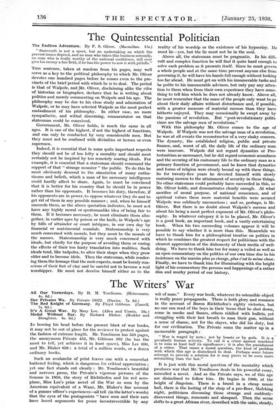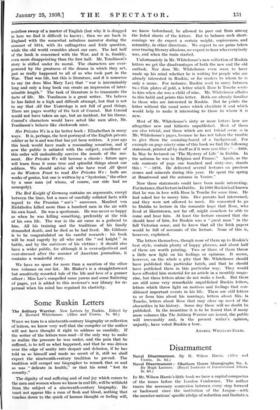The Writers' War
Her Privates We. By Private 19022. (Davies. 7s. 6d.)
Is bowing his head before the present blast of war books, it may not be out of place for the reviewer to protest against the fashion of extreme length. Mr. Tomlinson has 539 pages, the anonymous Private 453, Mr. Gibbons 392 (he has the most to tell, yet achieves it in least space), Miss Lee 690, and Mr. Blaker 638: a total of a million words, or a dozen ordinary books.
Such an avalanche of print leaves one with a somewhat battered feeling, which is dangerous for critical appreciation ; yet one fact stands out clearly : Mr. Tomlinson's beautiful and nervous prose, the Private's vigorous pictures of the Somme in 1916, the story of Richthofen and his red aero- plane, Miss Lee's prize novel of the War as seen by the American equivalent of a Waac, Mr. Blaker's fine account of a gunner officer's experiences all tell (in the latter's words) that the eyes of the protagonists " have seen and their ears have heard arguments for peace incontrovertible by any wit of man." Every war book, whatever its ostensible object is really peace propaganda. There is both glory and romance in the account of Baron Richthofen's eighty victories, but no one can read of the boys in their 'teens that he shot down, some in smoke and flames, others riddled with bullets, yet struggling with their last breath to man their gun, without a sense of shame, not for the slayer, who did his duty, but for our civilization. The Private sums the matter up in a memorable paragraph :
" War is waged by men ; not by beasts or by gods. It is a peculiarly human activity. To call it a crime against mankind is to miss at least half its significance ; it is also the punishment of a crime. That raises a moral question, the kind of problem with which this age is disinclined to deal. Perhaps some future attempt to provide a solution for it may prove to be even more astonishing than the last."
It is just with this moral question of the mentality which produces war that Mr. Tomlinson deals in his powerful essay, miscalled a novel. And as the Private says, we of this age are disinclined to follow him. He begins in 1900, at the height of Jingoism. There is a brawl in a cheap music hall, there is the looting of the shop of a pro-Boer, Mafeking night, politicians discussing those strange and suddenly- discovered things, remounts and shrapnel. Then the scene shifts to a great African river, described with the calm, steady, resistless sweep of a master of English (but why it is dragged in here we find it difficult to know) ; then we are back in England with the somewhat nebulous narrator during the summer of 1914, with its suffragettes and Irish question, while the old world crumbles about our ears. The last half of the book is concerned with the War, and it is, frankly, even more disappointing than the first half. Mr. Tomlinson's story is stifled under its moral. The characters are over- powered by the greatness of the drama in which they act, just as really happened to all of us who took part in the War. That was life, but this is literature, and it is nonsense to say (as does Miss Mary Lee) that " war is interminably long and only a long book can create an impression of inter- minable length." The task of literature is to transmute the facts of life. Mr. Tomlinson is a great writer. We believe he has failed in a high and difficult attempt, but that is not to say that All Our Yesterdays is not full of good things. There are pages worthy of the best of Conrad. But Conrad would not have taken an age, but an incident, for his theme. Conrad's characters would have acted like men alive, Mr. Tomlinson's behave like clockwork mice.
Her Privates We is a far better book : Elizabethan in many ways. It is, perhaps, the best portrayal of the English private soldier as he is and was that has yet been written. A year ago this book would have made a resounding sensation, and if now the public is satiated with the subject, excellence of this order will undoubtedly survive the moods of the mo- ment. Her Privates We will become a classic : future ages will learn from it some true and splendid things about our soldiers. We should athiise all who have read All Quiet on the Western Front to read Her Privates We : both are works of genius, but one is written by a " hysterian," the other by a sane man (of whom, of course, our side had no monopoly).
The Red Knight of Germany contains no arguments, except between the lines, but a mass of carefully collated facts with regard to the Prussian " ace's " successes. Manfred von Richthofen killed more than a hundred men in the air with his own hand. He was a sportsman. He was never so happy as when he was killing something, preferably at the risk of his own life. The war in the air came as a godsend to him. All his training and the traditions of his family demanded death, and he died as he had lived. Mr. Gibbons is to be congratulated on his careful research : his book will be read eagerly by all who met the " red knight " in battle, and by the survivors of his victims : it should also have a wider public, for although it is over-adjectived and over-stressed after the manner of American journalism, it contains a wonderful story.
We have no space for more than a mention of the other two volumes on our list. Mr. Blaker's is a straightforward but sensitively recorded tale of the life and love of a gunner officer : Miss Lee's compelled some yawns and some fluttering of pages, yet is added to this reviewer's war library for re- perusal when his mind has regained its elasticity.







































 Previous page
Previous page